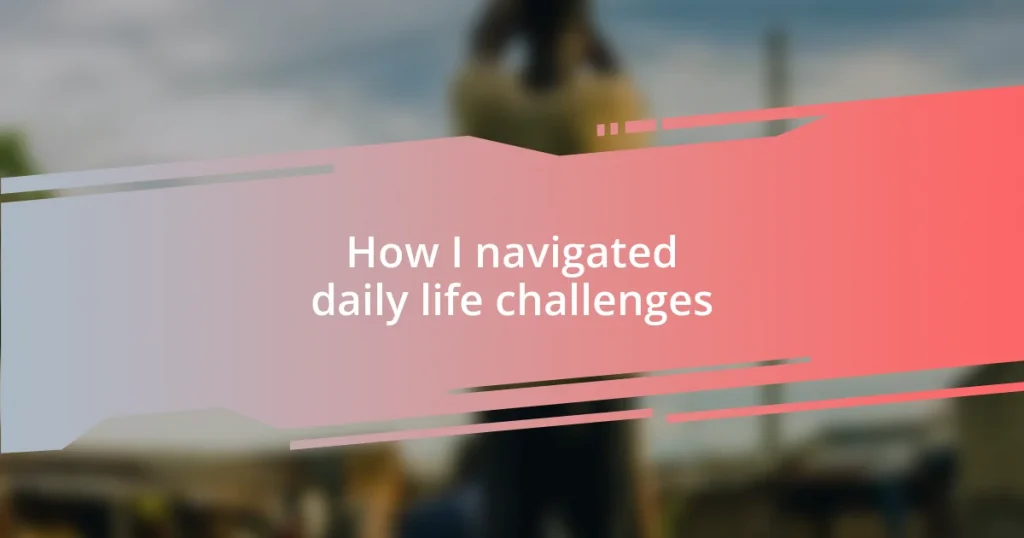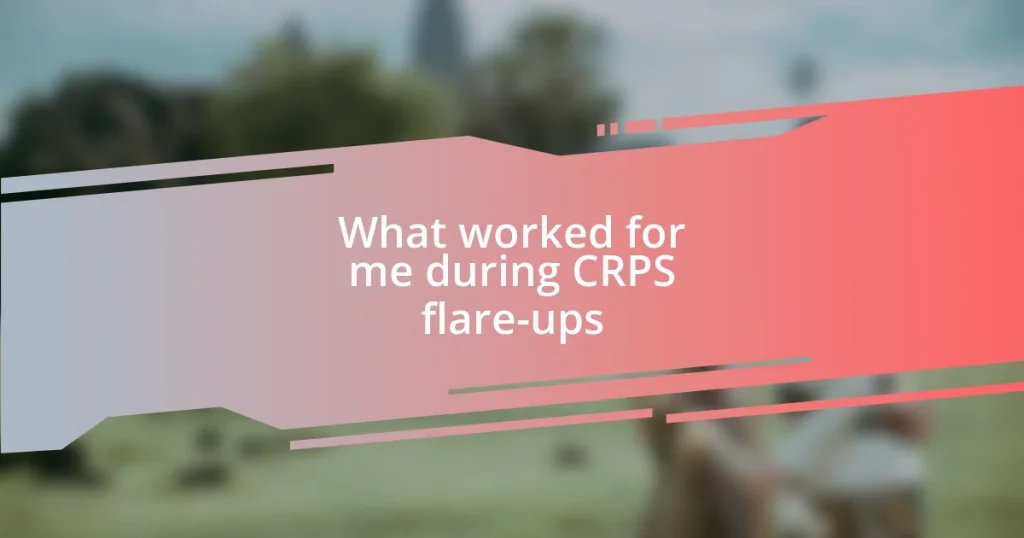Key takeaways:
- Identifying daily challenges through reflection, such as journaling, helps transform stressors into manageable tasks.
- Acknowledging personal strengths, like empathy and organization, empowers individuals to navigate challenges effectively.
- Practicing mindfulness and resilience fosters personal growth, enabling one to embrace setbacks as opportunities for learning and adaptation.
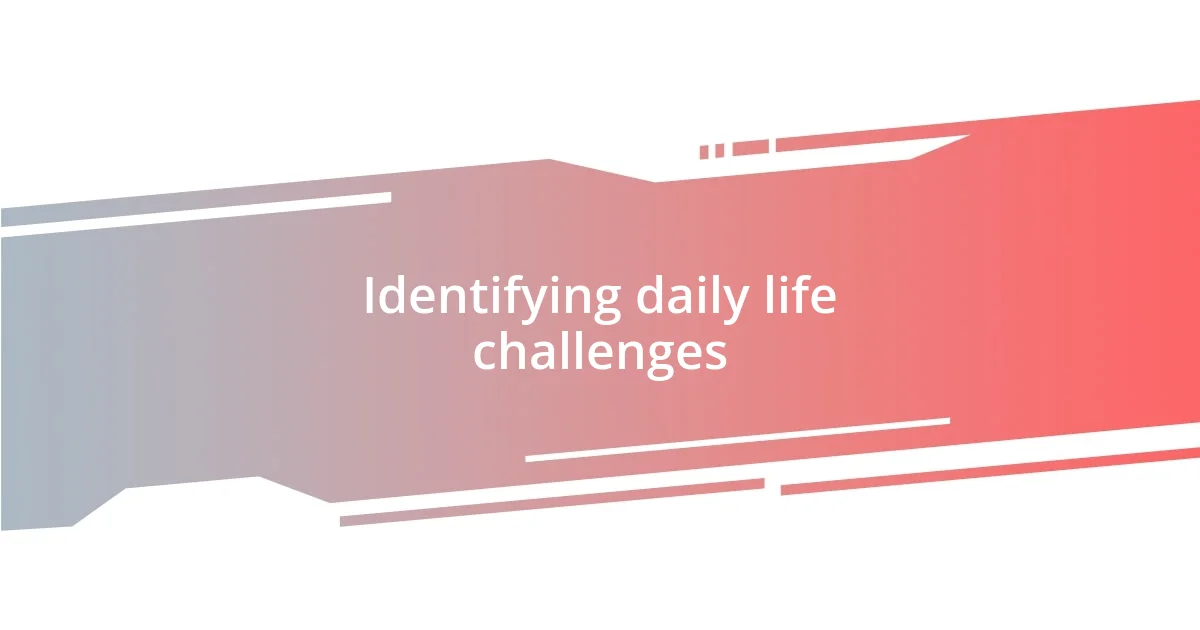
Identifying daily life challenges
Identifying daily life challenges can often feel overwhelming, especially when they seem to pile up out of nowhere. I remember a time when juggling a hectic work schedule and family commitments left me drained every evening. Reflecting on those moments, I realized that daily struggles often stem from unmet expectations—both from ourselves and others.
In my experience, recognizing the specific sources of my stress was crucial. It was a rainy Wednesday when I sat down with a cup of tea, questioning why I felt so anxious. Was it the constant notifications from work emails or the guilt of not spending enough time with loved ones? Pinpointing these factors helped me to see that not every challenge is a mountain; sometimes, it’s just a series of small hills waiting to be acknowledged.
I’ve found that keeping a journal can be a powerful tool in this process. During one particularly hectic week, I began jotting down thoughts and feelings each night. It allowed me to spot patterns—like how a lack of sleep impacted my mood and productivity. What challenges do you face daily that could be addressed through reflection? Identifying them is the first step in transforming those hurdles into manageable tasks.
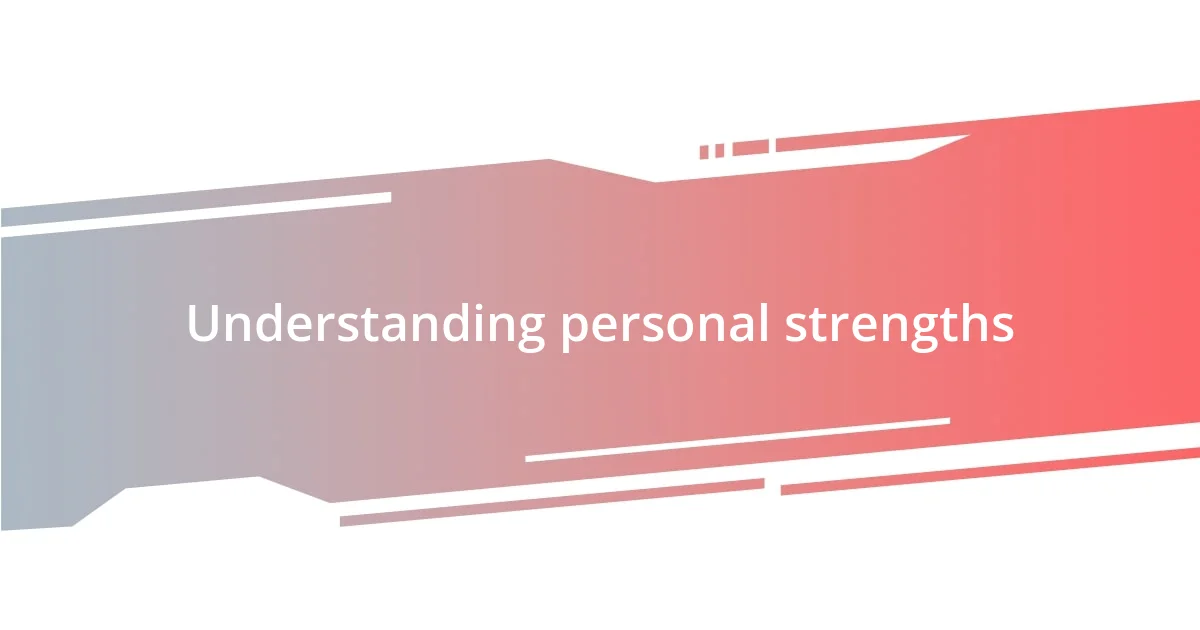
Understanding personal strengths
Understanding my personal strengths has been a transformative experience. I recall a time when I felt lost amidst my responsibilities. One evening, reflecting on a particularly tough week, I discovered that my ability to empathize with others was a strength I had overlooked. This realization shifted my perspective; instead of viewing my tendency to listen as a weakness, I embraced it as a powerful tool to connect with those around me.
There’s something incredibly empowering about acknowledging what we excel at. I once attended a workshop on personal development, where we were encouraged to share our strengths. Initially, I hesitated, thinking about my shortcomings instead. But as I listened to others share their skills, I found the courage to speak up about my creativity. It was rewarding, and I realized how vital it is to celebrate our strengths; they often serve as the foundation for overcoming life’s challenges.
Strengths can also serve as anchors during turbulent times. This past month, when faced with a tight deadline for a work project, I leaned on my organizational skills to navigate the chaos. By breaking tasks into smaller, manageable parts, I not only accomplished my goals but also alleviated a considerable amount of stress. Have you ever leveraged your strengths to tackle a tough situation? Identifying these qualities empowers us to better face daily challenges.
| Personal Strength | Example of Application |
|---|---|
| Empathy | Connecting with friends in need |
| Creativity | Innovative problem-solving in projects |
| Organization | Managing deadlines effectively |
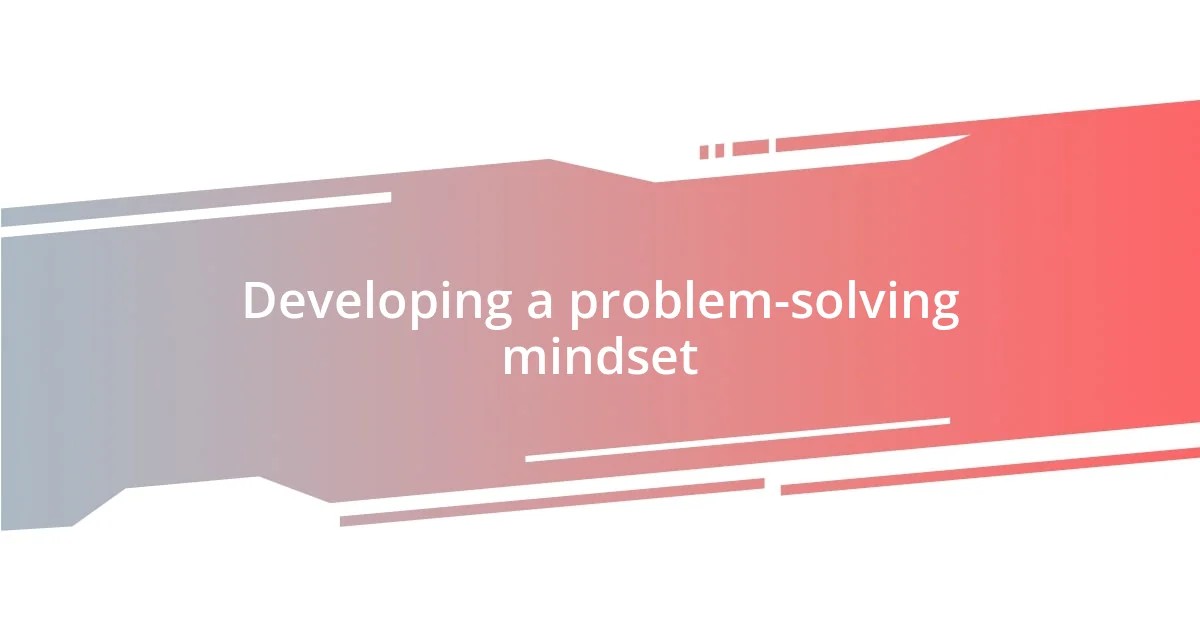
Developing a problem-solving mindset
Developing a problem-solving mindset is essential for navigating daily challenges. I remember one morning when I faced a particularly chaotic schedule. I realized my usual response was to feel overwhelmed, so I decided to shift my approach. Instead of seeing the day as a series of obstacles, I started viewing it as a puzzle, where each piece needed to be placed carefully to create a complete picture. This mindset shift made a significant difference—transforming stress into curiosity about how I could rearrange tasks to fit more smoothly together.
Here’s what I learned that helped me cultivate a stronger problem-solving mindset:
- Stay Curious: Embrace a sense of wonder about challenges; ask yourself, “What can I learn from this?”
- Break It Down: Large problems can feel daunting. I found that breaking them into smaller, actionable steps turns mountains into manageable hills.
- Seek Different Perspectives: When I felt stuck, I reached out to friends or colleagues for their insights. Fresh viewpoints often reveal solutions I hadn’t considered.
- Practice Resilience: Each setback became a lesson. I recall a project that didn’t go as planned; instead of wallowing in disappointment, I looked for what I could adjust moving forward.
- Celebrate Small Wins: I’ve learned to acknowledge even the smallest victories, reinforcing my problem-solving mindset and encouraging continued progress.
Emphasizing these strategies not only helps in addressing challenges but also fosters a resilient approach to daily life.
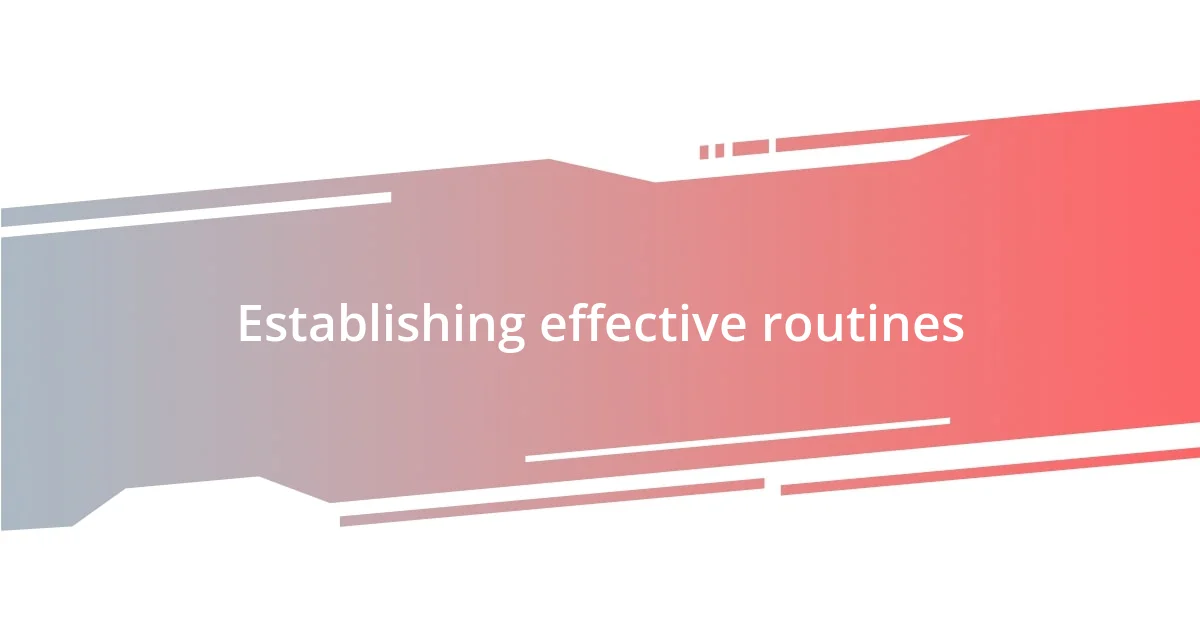
Establishing effective routines
Establishing effective routines has been a game-changer for me. When I first started implementing a structured schedule, I felt a wave of relief wash over me. It was as if I had unlocked a secret door to productivity. For instance, I began my mornings with a consistent ritual of journaling and stretching. This small commitment set a positive tone for my day, grounding me and allowing me to tackle challenges with a clearer mind.
I often reflect on how a simple evening routine transformed my evenings from chaotic to calm. By dedicating my last hour of the day to winding down—reading a book or prepping for the next day—I noticed I slept better and woke up feeling refreshed. Doesn’t it amaze you how small adjustments can create such significant shifts? Embracing these moments of preparation made me more intentional about my time, leading to better focus on both work and personal goals.
One critical lesson I’ve learned is the power of flexibility within routines. I remember a particularly hectic week when unexpected obligations piled up, testing my resolve. Instead of rigidly adhering to my original schedule, I adapted by prioritizing essential tasks and allowing for downtime when I needed it. This experience reinforced my belief that effective routines are not about perfection but about creating a framework that supports our well-being and growth. Have you noticed how adjusting your routines can sometimes reveal new opportunities?
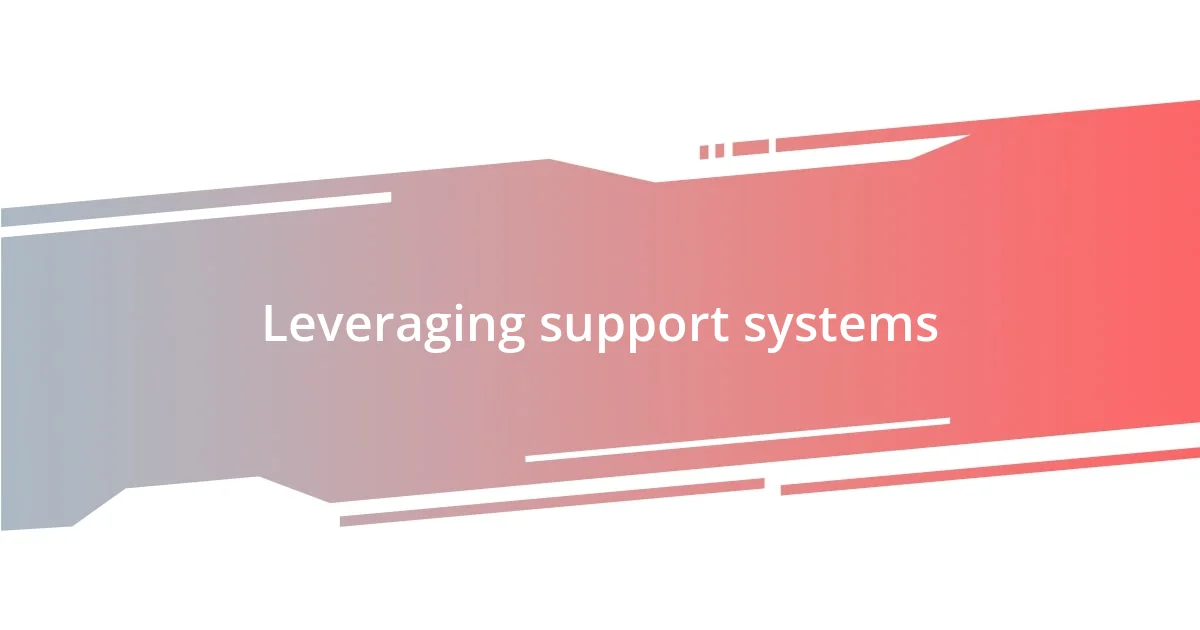
Leveraging support systems
Leveraging support systems has been invaluable in my journey through daily challenges. I can’t emphasize enough how much a trusted friend can lighten the load during tough times. There was an instance when I faced an overwhelming work deadline. Rather than isolating myself in stress, I reached out to a colleague for help. Their encouragement and shared insights not only reinforced my confidence but also offered a fresh perspective that I hadn’t considered. Don’t you think having someone to lean on makes a world of difference?
I’ve also realized that family support can be a double-edged sword—so comforting yet sometimes tricky to navigate. During a particularly challenging phase in my life, I turned to my family for advice. Their intentions were good, but I felt overwhelmed by contrasting opinions. It taught me the importance of setting boundaries and communicating my needs clearly. Have you ever found yourself in a similar situation where well-meaning support felt more like pressure?
On a more structured level, I harnessed community resources to bolster my efforts. I joined a local support group that focused on personal development. The collective energy and shared experiences were incredibly uplifting. Listening to others share their stories reminded me that I wasn’t alone in facing struggles. Can you imagine how powerful it is to realize we’re all on this journey together? The connections I formed there not only enhanced my resilience but also broadened my perspective on overcoming challenges.
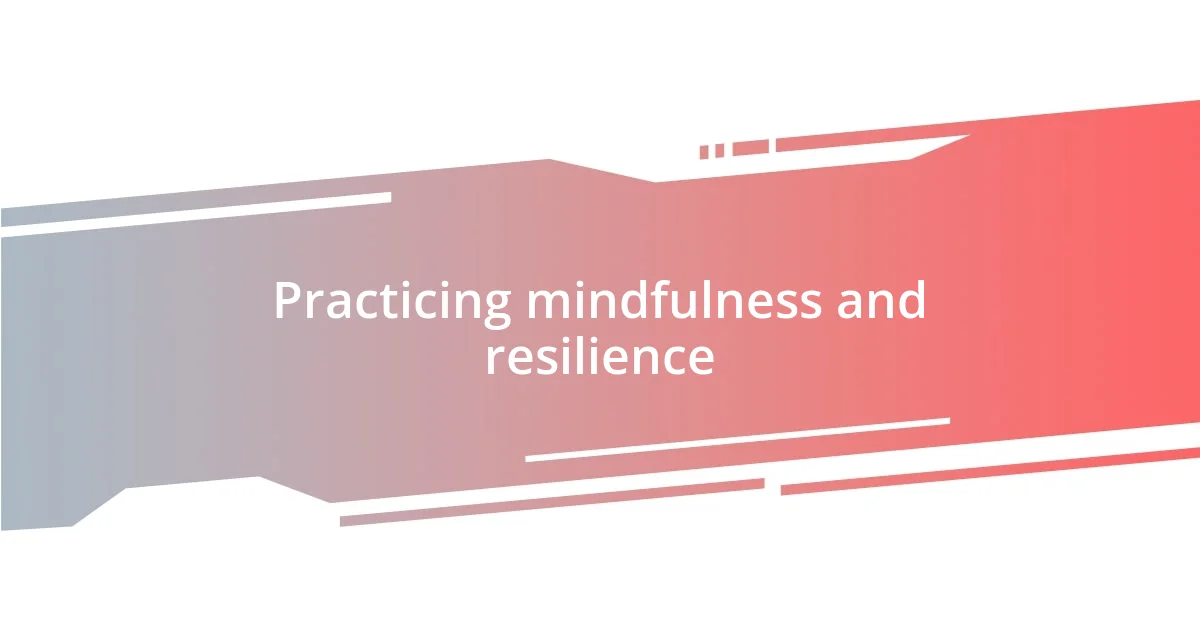
Practicing mindfulness and resilience
Practicing mindfulness has become a cornerstone in my daily life, especially during stressful moments. I remember a chaotic day when everything seemed to go wrong. Instead of letting anxiety take over, I took a few minutes to breathe deeply and focus on my surroundings—the rustling leaves outside my window and the calming aroma of my coffee. This simple act of mindfulness helped to ground me, allowing me to approach my tasks with renewed clarity and calmness. Have you ever tried taking just a moment to notice the little things around you? It can transform your perspective almost instantly.
Resilience is another vital skill that I’ve learned to cultivate over time. One particular instance stands out in my memory: facing a big personal setback, I initially felt disheartened. Rather than allowing myself to dwell in that space, I took it as an opportunity for growth. I started reflecting on what I could learn from the experience and how I could adapt moving forward. It wasn’t easy, but embracing the challenge strengthened my resolve. Don’t you find that sometimes our toughest moments help us build the most resilience?
In practicing both mindfulness and resilience, I’ve discovered the power of gratitude as a daily habit. On days when negativity threatened to creep in, I embraced the practice of listing three things I was thankful for. I recall one particularly tough week where every day felt like an uphill battle. By focusing on those moments of gratitude—like a comforting conversation with a friend or the cozy warmth of my home—I started shifting my mindset. It’s fascinating how this simple practice can help us appreciate life’s positive aspects, even amidst challenges. Have you ever considered how gratitude could change your own outlook?
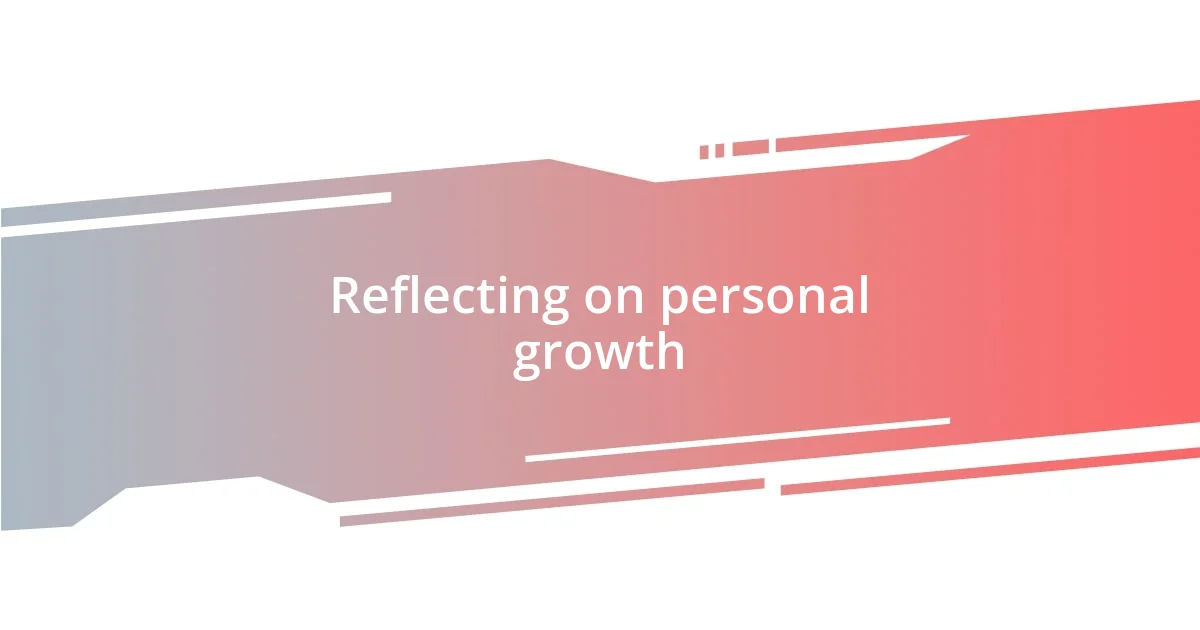
Reflecting on personal growth
Reflecting on personal growth often unveils a tapestry of lessons learned over time. I still vividly remember a moment when I found myself grappling with self-doubt after a presentation that didn’t go as planned. Instead of internalizing my disappointment, I took the time to dissect what went wrong. This self-reflection not only illuminated my areas for improvement but also revealed the resilience I had developed. Have you ever had a misstep that, when reflected upon, turned out to be a stepping stone toward your growth?
As I look back on my journey, it’s clear that discomfort often breeds growth. After facing a series of challenges in my career, I felt the weight of uncertainty heavy on my shoulders. But I also noticed that each setback nudged me to explore alternatives and bolstered my adaptability. It was through navigating these uncomfortable situations that I learned my capacity to pivot and thrive. Isn’t it fascinating how our struggles can unveil hidden strengths we didn’t know we possessed?
In my reflections, I’ve grown to appreciate the importance of celebrating small victories. I recall an instance where I achieved a personal milestone after months of diligent effort. Rather than brushing it off, I took the time to celebrate with a small treat—maybe a favorite dessert or a leisurely evening. These moments of acknowledgment fostered motivation and instilled a deeper sense of fulfillment. Have you ever considered how recognizing your achievements, no matter how small, contributes to your overall growth story? Embracing these moments has been crucial in shaping my perspective on what it means to evolve.










